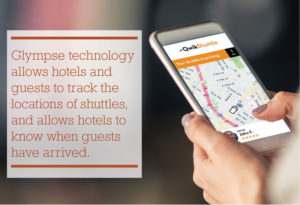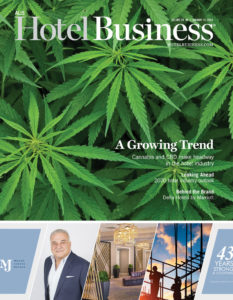SEATTLE—Location-sharing technology company Glympse, which was founded 12 years ago, recently expanded its reach to allow hotels and guests to make use of airport shuttles more convenient.
“We have an application that allows people to share their location temporarily and gives them complete control with each other,” said Chris Ruff, president/CEO, Glympse. “The use case is this: I’m meeting someone for a cup of coffee and am running late. I can send a text or a call that I’m running late, but, if I send a Glympse, they can see exactly where I am and how long it will take me to get there. It is sort of like ‘Uber-izing’ me, to see when I will show up.”
That location-sharing technology can easily be applied to the shuttling of guests, according to Ruff. “Imagine that you have landed at LAX and you don’t know when your shuttle is going to get there,” he said. “It seems to never be your shuttle. I know what a lot of people will do today is immediately grab the Uber or Lyft app and have them take them to the hotel because it might not cost that much. But if they knew that it was going to be there quickly, they would save the money. So now, all of a sudden, there’s the benefit we can bring to that use case. The guest will actually know when it will arrive by seeing that the shuttle is coming back from the hotel to the airport. They know that it is worth their time to wait for the free ride.”
Using the technology, if the guest shares their location with the hotel, a shuttle can be deployed on demand during certain parts of the day. “If you know that someone has arrived, it will probably take them 15-20 minutes to clear from the gate out,” he said. “Instead of keeping a [set]schedule, you would actually have time to get the shuttle closer to on-demand for them, especially at low-volume times of the day. We think we can add a benefit to the customer journey by making that more seamless.”
In the case of guests tracking the location of a shuttle, they do not need to let the hotel know their location if they don’t want to. “The hotel can provide that through a web link instead of a native app,” said Ruff. “The guest would have to agree to some level of digital communication; an SMS, email or web view can be put inside the hotel app as well. It is just a view, and it doesn’t require any extra installation, so if the guest doesn’t have the app, they can be sent a web link. They click on the web link, their mobile browser opens and they would be able to see where all of the shuttles are. It is very nonintrusive in that way. It is not hard to launch that because you can do it without your guests having to download an app.”
 If the guest wants the hotel to know their location, they would need to use the hotel’s mobile app. “The client will often put it in their mobile app,” he said. “It is not a Glympse app; it is a Glympse SDK inside of the app.”
If the guest wants the hotel to know their location, they would need to use the hotel’s mobile app. “The client will often put it in their mobile app,” he said. “It is not a Glympse app; it is a Glympse SDK inside of the app.”
The location sharing is only temporary. “Travelers are going to be reluctant to turn on location sharing permanently with the app, but because Glympse is a temporary location-sharing platform, they can set it for just the time that it is useful to the business and to the consumer,” he said.
Being able to track a shuttle’s location not only provides a benefit to the guest, but the hotel as well—particularly as it pertains to calls from guests wondering where a shuttle is. “In a place where people are promised a shuttle and they can’t figure out where the shuttle is, human nature is to call the hotel and, of course, that phone call goes to the front desk in most situations,” said Ruff. “It could be a busy time of the day, but the front desk is being asked where the shuttle is and they have no idea where it is. All they can say is that it is on its way because they really don’t know. They don’t know what traffic looks like out there.”
With the tracking, the staff will know when it will be there. “We have a kiosk mode that would give an estimation of when the shuttle will be at the destination,” he said. “You’ve got a tool that will help provide better customer service. But, more importantly, utilizing Glympse, the guest probably doesn’t make the phone call, so you completely deflect all of that customer service. If they know where it is, they don’t have to call. That is a big benefit.”
The app can also benefit hotels that have contracts to house airline crews. “They have a high level of service that they have to give those flight teams,” said Ruff. “They have to get them on time to their gates. Knowing where the shuttles are and being able to predict more accurately when they will be there to pick them up could be a benefit even in helping negotiate contracts that are pretty lucrative to these hotels. Even getting them to the hotels quickly when they arrive is a major benefit.” HB

